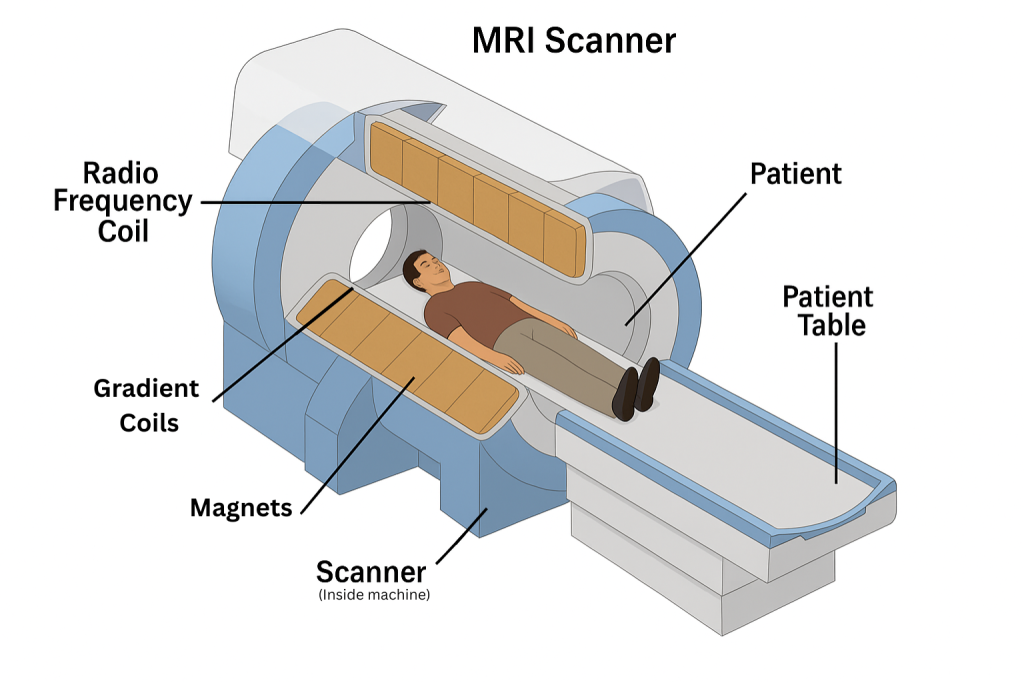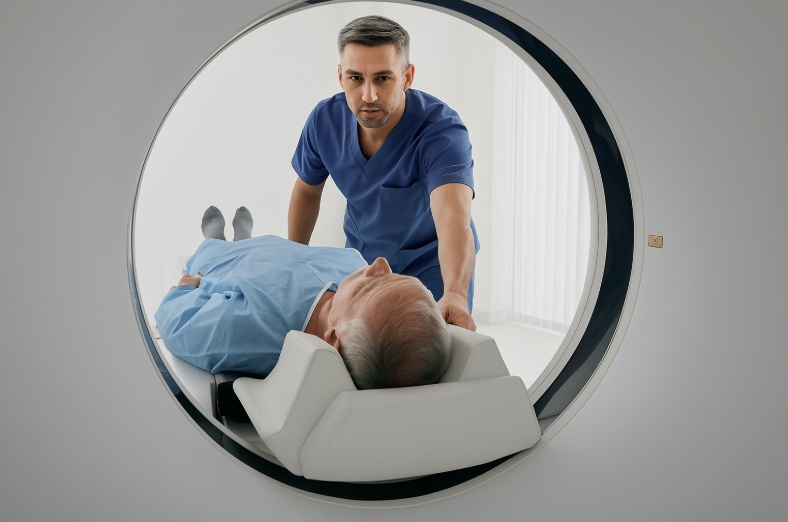An MRI scan is a medical test that takes very detailed pictures of the inside of your body. Instead of using X-rays, an MRI scan uses strong magnets and radio waves to make the images.
Simple carousel diagram to show the MRI scan procedure (Brain imaging).
MRI stands for Magnetic Resonance Imaging. It’s a safe and painless way for doctors to see organs, muscles, joints, and other soft tissues in much more detail than other scans. In the UK, an MRI scan is often used when an X-ray or CT scan can’t provide enough information. Doctors use MRI scans when they need a clear look at soft tissues such as the brain, muscles, heart, and joints. The pictures help find problems, track how a condition is changing, or plan the best treatment.
An MRI scan can show many parts of the body in great detail. This includes:
The brain and spinal cord — to check for strokes, tumours, or nerve damage.
Joints — to look at ligaments, cartilage, and muscles after injury.
The heart and blood vessels — to see how well they are working.
Internal organs — such as the liver, kidneys, and womb.
Because MRI scans can clearly show soft tissue, they are often chosen when other scans, like X-rays, might not give enough information.
An MRI scanner is a large, tube-shaped machine with a tunnel in the middle. You lie on a table that slides into the tunnel. The scanner uses a powerful magnetic field and radio waves to create signals from the water molecules inside your body.
These signals are picked up by the machine and turned into pictures by a computer. Different tissues in your body give different signals, which is why the images are so detailed.
The process is painless, but the scanner can be noisy, so earplugs or headphones are usually given.

When it’s time for your MRI scan, you may need to change into a hospital gown. You’ll remove all metal items like jewellery, watches, or belts. If you have any metal inside your body, such as a pacemaker or surgical clips, you must tell the radiographer before the scan, as the magnets can affect these.
You will lie on the table, which moves slowly into the tunnel. The radiographer will be in a separate room but will be able to see and hear you at all times. They may ask you to keep still or hold your breath for a few seconds while the pictures are taken.
If contrast dye is needed to make certain areas show up more clearly, it might be given through a small injection.
The time for an MRI scan can vary depending on what part of the body is being looked at. Some scans are finished in about 15 minutes, but others can take up to an hour.
This time includes getting you ready, positioning you correctly, and taking the images. If contrast dye is used, it may take a little longer.
MRI scans are generally very safe. They do not use radiation, unlike X-rays or CT scans. However, because they use magnets, they are not suitable for everyone. People with certain metal implants or medical devices may not be able to have an MRI scan.
The contrast dye used in some scans is safe for most people, but in rare cases, it can cause allergic reactions. If you have kidney problems or any allergies, tell the radiographer before the scan.
Pregnant women can usually have MRI scans if needed, but doctors may avoid them in the first three months unless there is an urgent reason.
An MRI scan is done by a trained healthcare worker called a radiographer. They know how to operate the scanner and make sure you are safe and comfortable during the test.
After the scan, the images are reviewed by a radiologist — a doctor who specialises in reading medical images. The radiologist writes a report for the doctor who referred you, who will then explain the results to you.

Will it hurt?
No, an MRI scan is painless. The only discomfort may be lying still for a long time or hearing loud noises from the machine.
Can I move during the scan?
It’s important to keep as still as possible so the images are clear. If you move, the pictures may be blurry, and you might have to repeat part of the scan.
Do I need someone to come with me?
Most people do not need someone with them, but you can bring a friend or family member for support if it makes you feel more comfortable. They will usually have to wait outside the scanning room.
Can children have MRI scans?
Yes, MRI scans can be done for children. In some cases, young children may need a mild sedative to help them stay still during the test.
Can I eat and drink before the scan?
For most MRI scans, you can eat and drink as normal. If you need contrast dye, you may be asked not to eat or drink for a few hours before the test.
Average wait times for patients to have an MRI scan in the UK (NHS vs. Private)
Sources: Practice Plus Group, Get Scanned
An MRI scan is a safe and detailed test that lets doctors see inside your body without using radiation. It is especially good for looking at soft tissues like the brain, muscles, heart, and joints. The scan is painless, though you will need to stay still, and it can take from 15 minutes to an hour. After the scan, a specialist doctor will study the images and send the results to your doctor, who will explain them to you.
If you ever have concerns about having an MRI scan, you can talk to your doctor or the radiographer. They can answer your questions and help you feel more at ease.
Disclaimer: Seonat provides general health information for educational purposes only. This content is not a substitute for professional medical advice, diagnosis, or treatment. Always seek the advice of your GP or another qualified health provider with any questions about a medical condition or before making health decisions.

Simplifying health information for those who need it most
Please note: we are not medical professionals, and the content on this website is for general information only. Always speak to a qualified healthcare provider for medical advice.